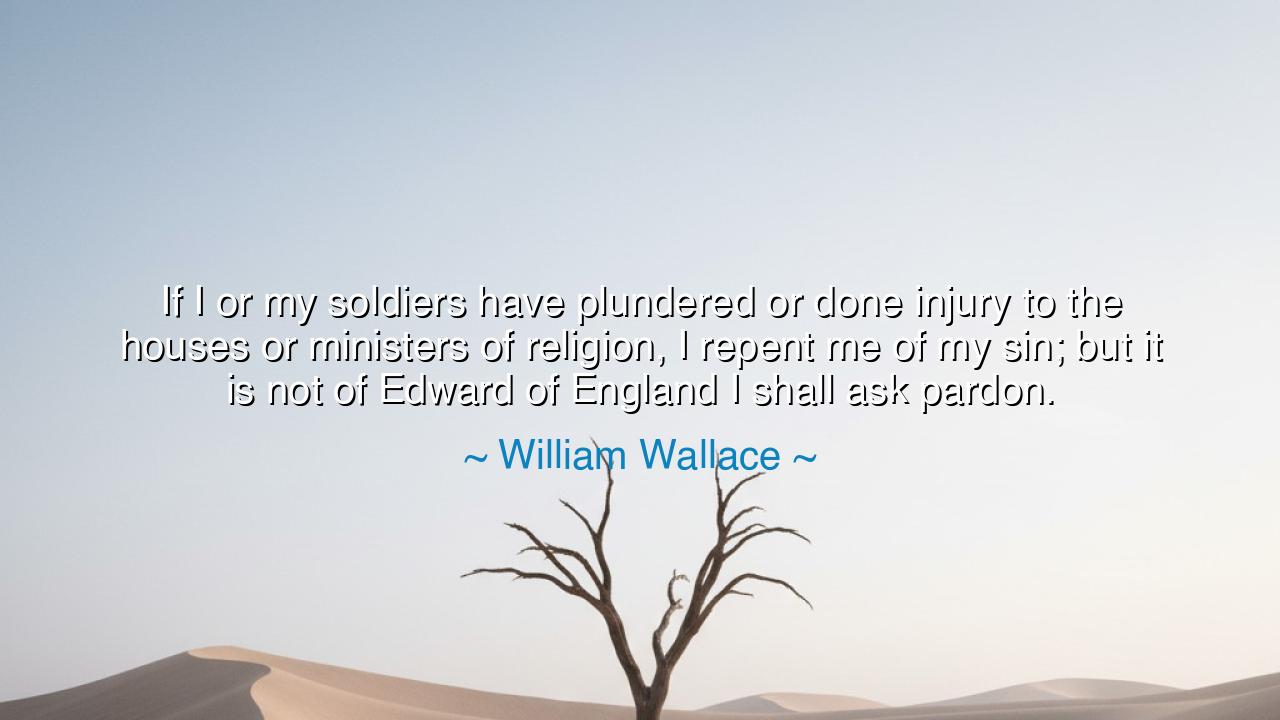
If I or my soldiers have plundered or done injury to the houses
If I or my soldiers have plundered or done injury to the houses or ministers of religion, I repent me of my sin; but it is not of Edward of England I shall ask pardon.






Hear, O children of freedom, the fierce words of William Wallace, the Guardian of Scotland: “If I or my soldiers have plundered or done injury to the houses or ministers of religion, I repent me of my sin; but it is not of Edward of England I shall ask pardon.” In this defiant utterance we hear the heart of a man who bowed only before God, not before the earthly oppressor. For Wallace knew that sins against heaven must be confessed to heaven, but he would never humble himself before a tyrant who cloaked conquest in false righteousness.
The origin of this saying lies in Wallace’s struggle against Edward I of England, who sought to subjugate Scotland with sword and fire. Accused of sacrilege and brutality, Wallace refused to let his enemies twist his cause into dishonor. He admitted his humanity—confessing that wrongs may have been done in the heat of war—but he drew a line of fire between divine justice and political manipulation. Before God he would kneel; before Edward, never. In these words we see the fierce independence of a man who believed that true judgment belongs not to kings, but to the Almighty.
The ancients also knew this truth. When Socrates was condemned by Athens, he submitted to the laws of his city, but he reminded his judges that there is a higher law than theirs, a law of truth and conscience. When the prophets of Israel denounced kings for injustice, they too declared that no earthly throne could absolve or condemn without reference to heaven’s command. Wallace stood in this same tradition, proclaiming that sin must be confessed to God, not to oppressors, and that forgiveness cannot be demanded by tyrants who themselves commit greater wrongs.
Consider the story of Joan of Arc, who centuries later was tried by English churchmen for heresy and rebellion. She, too, refused to admit guilt before her enemies, declaring instead her submission to God’s judgment alone. Burned at the stake, she died as Wallace did, with defiance on her lips and faith in her heart. Both teach us that the approval of oppressors means nothing, and that the conscience of the righteous must seek absolution only from the Eternal.
The meaning of Wallace’s words is both heroic and humbling. He does not deny the possibility of wrongdoing—indeed, he shows the humility to repent before God—but he refuses to let repentance be twisted into submission. His statement is both confession and rebellion, a paradox of faith and fire. In this lies the greatness of his spirit: he could admit sin without surrendering his cause, and he could seek forgiveness without bowing to tyranny.
The lesson for us is clear: do not confuse earthly authority with divine authority. When you have wronged another, confess and repent sincerely—but do not let oppressors use your humility as their triumph. Bow only before what is true, eternal, and just. Let your conscience be ruled by God, not by those who exploit guilt for power. In this balance—humility before heaven, defiance before injustice—lies the strength of the truly free.
Practical actions stand before you: When you err, admit it openly, but direct your repentance to those you have harmed and to the divine, not to those who would twist your confession for their gain. When you are pressured to surrender your dignity in the name of appeasing power, resist as Wallace did. And always remember that true honor is not the absence of mistakes, but the courage to seek forgiveness without betraying your integrity.
Thus, remember the words of William Wallace: “It is not of Edward of England I shall ask pardon.” Live as he lived—humble enough to confess, but unbroken in spirit; repentant before God, but defiant before tyranny. For such is the path of the free, and such is the legacy that endures when empires fall and nations rise again.






AAdministratorAdministrator
Welcome, honored guests. Please leave a comment, we will respond soon